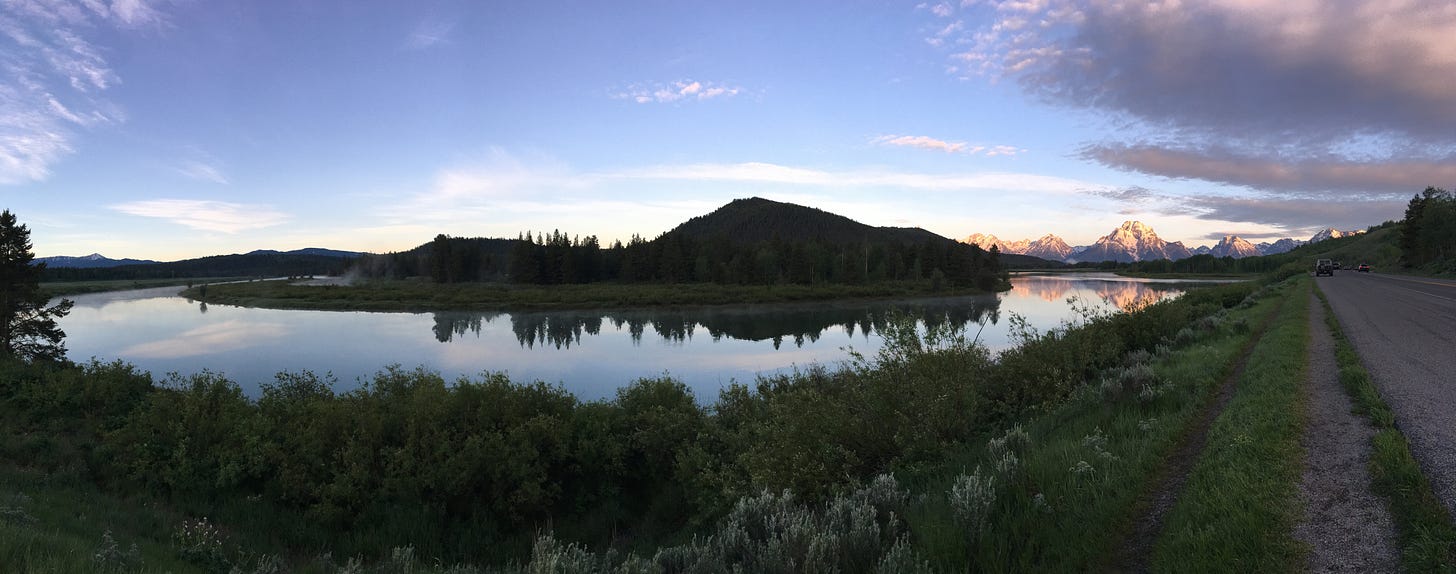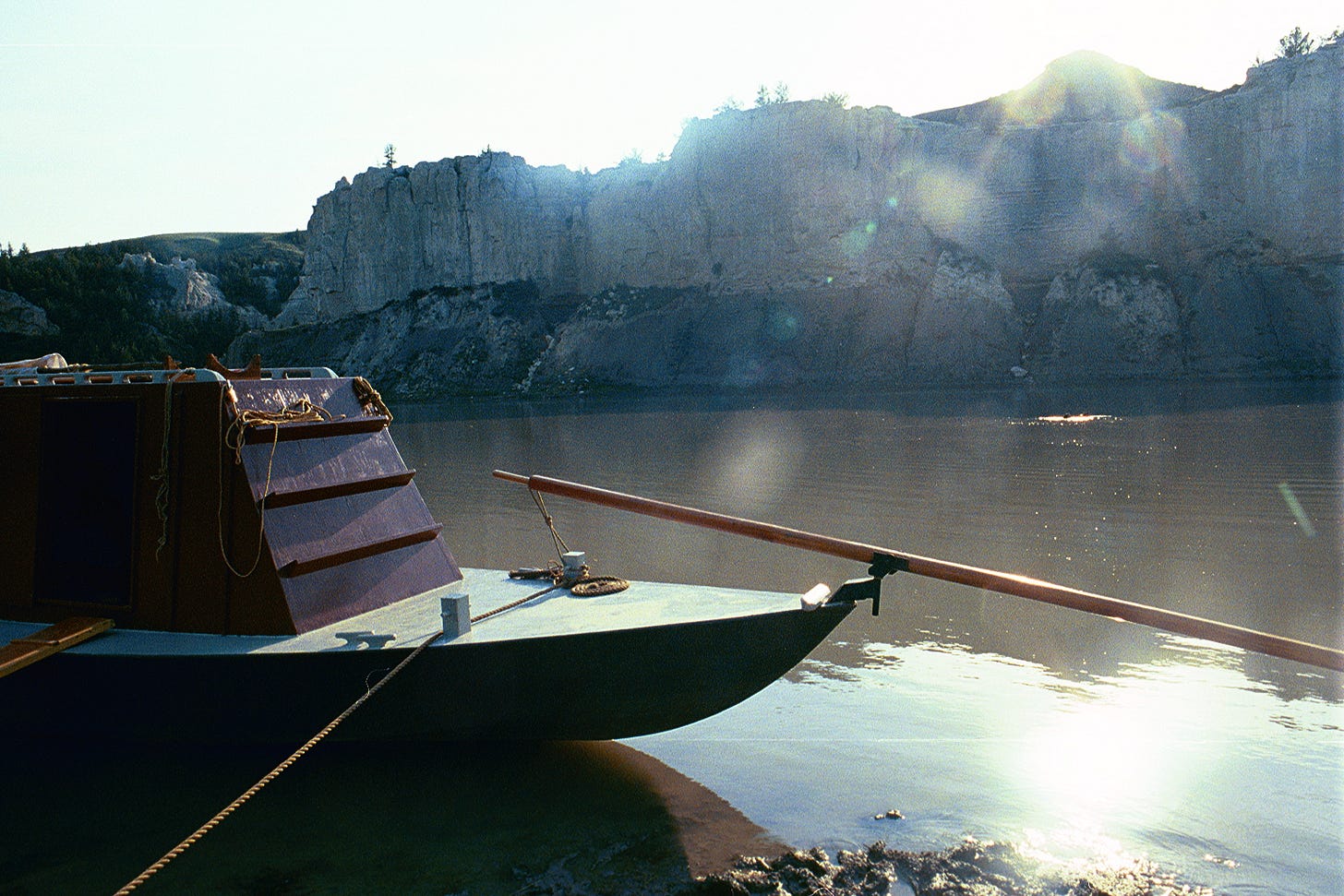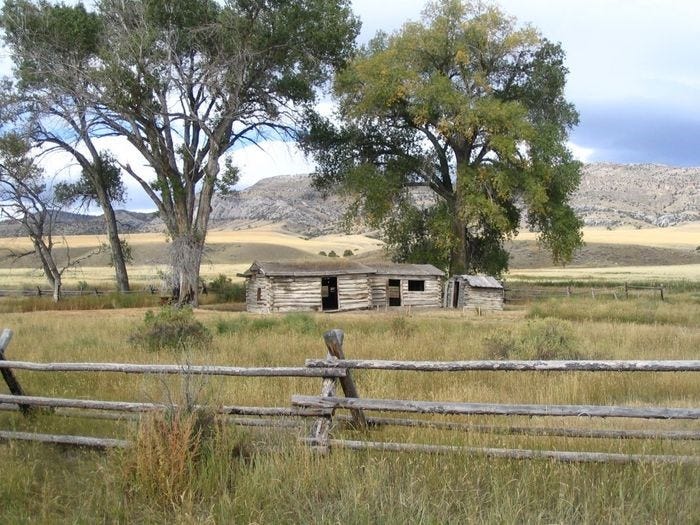The Ox-Bow on the Snake River - Grand Teton National Park - Moran Junction, Wyoming
The Frontier Calls
During the 19th century as pioneers moved West, they went with a purpose in mind. They had a vision for a better life on the frontier. The open spaces and freedom of the frontier were a place of opportunity.
Near the close of the century, historian Frederick Jackson Turner in his famous essay, “The Significance of the Frontier in American History”, noted that the 1890 Census claimed that the free and open land in the country had been sufficiently settled that there was no longer an identifiable "frontier line." Turner wrote,
"This brief official statement marks the closing of a great history movement. Up to our own day American history has been in a large degree the history of the colonization of the Great West. The existence of an area of free land, its continuous recession, and the advance of American settlement westward, explain American development.
Behind institutions, behind constitutional forms and modifications, lie the vital forces that call these organs into life and shape to meet changing conditions. The peculiarity of American institutions is, the fact that they have been compelled to adapt themselves to changes of an expanding people - to the changes involved in crossing a continent, in winning a wilderness, and in developing at each areas of this progress out of the primitive economic and political conditions of the frontier into the complexity of city life."
Just as Turner evoked, over a century ago, a belief in the American people to meet changing conditions, so today we are confronted with a world of changing conditions that demand that we change. One of the questions that rises from this perspective is "Whether American institutions are still able "to adapt themselves to changes of an expanding people?"
If the 19th century was the century where the frontier of free land was eclipsed, then the 20th century was the century where the frontier of economic opportunity was eclipsed in favor of the institutions of government and business. In both cases, these institutions created a type of dependency that required individuals to turn over their own individualism to become, essentially, wards of the institution. The egregiousness of this system was that men and their families worked the mines and "owed their soul to the company store."
The consequence of reaching a mature state, for both the institutions and the people within their social and organizational contexts, is the loss of a horizon that marks the frontier that is our future. As we look at the institutions of society, it is difficult to look beyond them to see what might be in the future. Is our present state of government and business our future, or are they a picture of the past that obscures our vision for the future?
The Necessity of the Frontier
Human beings need frontiers. We need them because we are seekers, discoverers, creators, innovators, and movers and shakers. We do not stand still. We seek to acquire, exchange, settle, resettle, destroy, restore, and expand that which is within our reach. For these human behaviors, we need a frontier to give us purpose and a horizon to reach after.
Stand at the edge of the frontier and we see ourselves better than at any point. We find that we are both great and small. We see beyond our reach. We discover that life is not yet complete, settled, and fixed. We realize that change is natural and healthy, as long as it leads toward the horizon of the frontier.
Seeing the Yellowstone Caldera from Mt. Washburn - Yellowstone National Park
Without a horizon for our lives, with no frontier, we lose perspective, we retreat into the comfort of what is known and owned. Our smallness before the frontier becomes diminished within the confines of what we can control. Without a frontier, we lose the better part of ourselves. Instead of initiating to create the future, we react to preserve a treasured, often nostalgic past.
A generation after his essay on the frontier, Turner published a follow up essay on “The Significance of the Section in American History”. In it he compares the West of the frontier to the settled civilization of the East.
"The East feared an unchecked democracy, which overturn minority rights, destroy established institutions, and attack vested interests. The buoyant, optimistic, and sometimes reckless and extravagant spirit of innovation was the very life of the West. In the East innovation was a term of reproach. It always "stalked" like an evil spirit. The East represented accumulated experience, the traditions of the family living generation after generation in a single location and under a similar environment, as President Thwing, of Western Reserve University, has aptly put it. But out in the newer West through most of its history men lived in at least two or three states in the course of their migrations."
These basic human differences become regional, or sectional, cultures. These differences exist today and mark the tension that makes social change so difficult now. They are so difficult because once the frontier has been settled, a shift takes place from the freedom and openness that is the frontier to the confines of institutionalization.
The American experience of the frontier is unique for the American West was not first colonized by institutions of government and business, and then the people came. No, the people came, and then their institutions followed. As a result, the Western United States, were not colonies of the East, but their own unique sectional creation.
The New Frontier
The frontier today is still geographic and economic, even more so now, technological and social. The geographic frontier is local, "How can our community thrive in the midst of the chaos of global change?" The economic frontier line is discovering alternative and complementary resources for communities and their business and organizations.
The advance of technology is where innovation and creativity are most broadly nurtured as the landscape of the frontier. It is free and open space, its virtual geography is in human ingenuity, relationship, and the networks that provide the structure for our interaction. From those networks, the frontiers of science and human knowledge present horizons that are only now coming into view.
Today's line of the frontier is more personal than ever before. If technology and its application in social networks are making a difference that matters, it will because it is utilized for a clear purpose. That purpose is an identified frontier that marks a horizon for us to venture toward. Whatever unexplored, under-achieved, far-off goal or aspiration that we have is the frontier of our lives.
It is personal because of the social and organizational institutions that defined the parameters of society in the 19th. and 20th. centuries are disintegrating, proving to have run their historic course. It is doubtful that a person graduating from high school or college next spring will spend their entire career with the same company. It is as Frederick Jackson Turner identified above in his essay on sectionalism in American history. When the frontier is sought, people move to where opportunities mark the horizon.
The challenge of this new frontier, for most of us, is not how to master the latest Facebook social media app or decide which smartphone to purchase. Rather, it is knowing for what purpose these technological innovations exist.
Activity or Achievement
The evidence to me that we have lost our horizon is how purpose is generally understood.
Here's an example of what I mean.
I take a trip to Florence, Italy, one of the most beautiful and picturesque places in Europe. I go to art galleries, eat fantastic food and drink wonderful wine, climb to the top of the Duomo, and return home to tell the tale of my trip.
In describing the trip, I tell of my flight, the hotel where I stayed, the museums and outlying towns I visited, the meals I had, and show the souvenirs that I purchased. And if you are really interested, I could take you through my credit card statement to show you what it cost me.
What does this description of a great trip tell you?
It is a listing of activities, of what I did. It is an accounting of the energy expended. It doesn't tell you the impact that the trip had upon me. It doesn't tell you how seeing Michangelo's David or the Chapel of San Lorenzo had a transformative effect upon me. It doesn't tell you how I am now different for having gone to the seat of the European Renaissance.
A statement of purpose, which is only a description of doing, is a purpose that has lost its horizon. It is a statement of institutionalized identity. It doesn't tell what it is that I seek to achieve or to become or to create or the impact that I wish to have. It doesn't say what I hope to change or the difference that we seek to make that matters.
The Journey is to Change Us
I use the journey illustration intentionally because to venture toward our horizons is to journey into the future. And it should change us and the people around us and the organizations where we spend our lives.
Over a decade ago, I became inspired by the story of Lewis and Clark and the Corps of Discovery. In that tale, I saw a picture of "the first 21st century leadership team." I was so inspired, that I persuaded my family to travel parts of the Lewis & Clark Trail with me. On one of our trips, we traveled by train from Chicago to Montana, to reach the portion of the trail that we were to visit. Over the course of 36 hours, we passed through very different geographic landscapes, from green regions of lakes and rivers, to flat, wide expanses of golden prairie to the “purple mountain majesty” of the northern Rockies.
Seeing those same horizons that Lewis & Clark crossed, floating down the Upper Missouri in a replica keelboat, camping where the Corps camped, and reading their journals in the geographic setting where they were written, I began to see why their Journey of Discovery impressed me so.
It changed the way I perceived the nature and character of leadership. I realized that Meriwether Lewis and William Clark understood something two hundred years ago, that we are just now rediscovering about leadership. Personal initiative and mutually respectful, collaborative relationships are the keys to organizational leadership in our time.



The experience of the trip changed our family. We were no longer a collection of genetically-linked individuals, each pursuing our own individualized personal mandates, in some zero-sum game of parent/sibling rivalry. We had a set of shared experiences that created a bond that is not only still with us a decade later, but the values derived from those experiences define who we are as both individuals and family.
If the journey of our lives or our businesses is only an activity, only an amusement, or only a utilitarian means to provide income for that which we really want to do, then its purpose is passive and limiting. It can be the source of short-term thinking and immediate gratification that limits what we can do. For if our purpose does not provide a far enough horizon, we will not willing to do the hard work and make the serious sacrifices to achieve what we seek. If so, then that horizon is too close.
However, if we approach our lives and the development of our organizations from the perspective of seeking to identify a lost horizon that sets a new frontier line, then immediately we are invigorated for a journey of self-discovery and future impact.
The New Frontier
We each must find a new frontier. Its far horizon calls us to think long-term, to delay gratification, to build social networks of collaborative endeavors, to take responsibility for making a difference beyond our own interests, and to create new institutional structures for the future.
Yet, in the midst of a persistent global recession, these words may ring hollow and seem to lack reality. Surely, to seek new frontiers when jobs are scarce and money is hard to come by is unrealistic. This is why the frontier exists, to show us that whatever is our experience today, tomorrow presents us with a new horizon.
For me, this perspective about the frontier, and how we as human beings relate to it, may best be described in a poem that Western poet Waddie Mitchell wrote for the Salt Lake City Winter Olympics. I find it a testimony to the truth that a horizon exists for each one of us if we'd only look up and see. I end with That No Quit Attitude, my favorite of his poems, which celebrates the spirit of the frontier.
THAT NO QUIT ATTITUDE - Waddie Mitchell
Listen and follow along in the text provided below
While gathering cattle near the ruins
of a long abandoned homestead
in the shadows of the mountains
Questions swarmed around my mind
of the people who had claimed there
most forgotten now, and long dead
still, I wonder what had prompted them
to leave their worlds behind
searching for a life uncertain
in a vast and rugged region
up and leave their home and kin
for opportunity to find.
Taking little more to start with
than an idea, and a reason
and a dream of their succeeding
in a future yet defined
Soon these queries led to more like
Why it is that some folks always
need to push their borders out beyond
the furthest milestone
on a never-ending quest to find
new ways and trails to blaze
and in the process, stretch that realm
of what is built and done and known
From the little draw above me
and my pard’s ride with his findin’s
throwing his bunch with mine
3now shaded up and settled down.
I could see that he had gone through battle
for his pony sporting lather
but his smile claimed that he had made it in
with everything he’d found.
The sweat and dust and brush streaks
on that pair done heaps of speaking
as he pulled up near, dismounted
and loosen latigo a bit.
Said, “we jumped ‘em in the roughs
and would’ve lost ‘em had we weakened
but, I swear, this here caballo
ain’t got one-half ounce of quit.”
And that ‘no quit’ phrase speaks volumes
on one’s character and makin’s
to a cowboy drawin’ wages
ridin’ ranges of the West
Those who have it, you’ll find, usually
conquer most their undertakings
for the best in them’s drawn out
when their spirits’ put to test
Then I spot my cow dogs bushed up
staying well hid from the cattle
knowin’, with a cue, they’d give all
to do anything need done
And I thought then how the most of us
will opt to shun that battle
never knowin’ fully what we could
accomplish or become
Still, I believe like dogs and horses
we’re all born with resolution
And, like muscles and good habits
it needs use and exercise
if left dormant, it’s in jeopardy
of lost evolution
for eventually it shrivels ups
and atrophy and dies
But when flexed, it blossoms heroes
And a source of inspiration
for we all recognize that virtues
In a ‘no quit’ attitude.
And it proves its attributes
in competition and vocation
Which evokes appreciation and a show of gratitude
And since mankind started walking
it has been swifter, higher, stronger
as if pushed by some deep need to keep their limits unconfined,
Almost thriving, always striving
for things bigger, better, longer
in an unrelenting pursuit of perfection, redefined.
And in this world that is soft complacence
there are still a few among the masses
who will readily give all to see a job or dream fulfilled
It’s a trait that’s void of prejudice
toward races, sex or classes
just demanding its possessor
be of valor and strong will.
Then, as we start our cattle homeward
lettin’ the dogs bring up the rear
and we leave what’s left of, once
somebody’s hopes and dreams behind.
I’m convinced that no quit attitude
will always persevere
Now it’s the essence and the promise
and the crown of humankind.
Copyright©WaddieMitchell








I enjoyed this. Made me think of the popular series "Yellowstone" which so many resonate with - a family protecting their land and a way of life increasingly under threat. The desire for "real" whether in real-estate or real views or real relationships is growing, IMO, proportionally and inversely with the push by technocrats to live in the virtual metaverse and merge human with the synthetic.
Humans want to belong on this planet and see their future tied to the earth. Thank you.